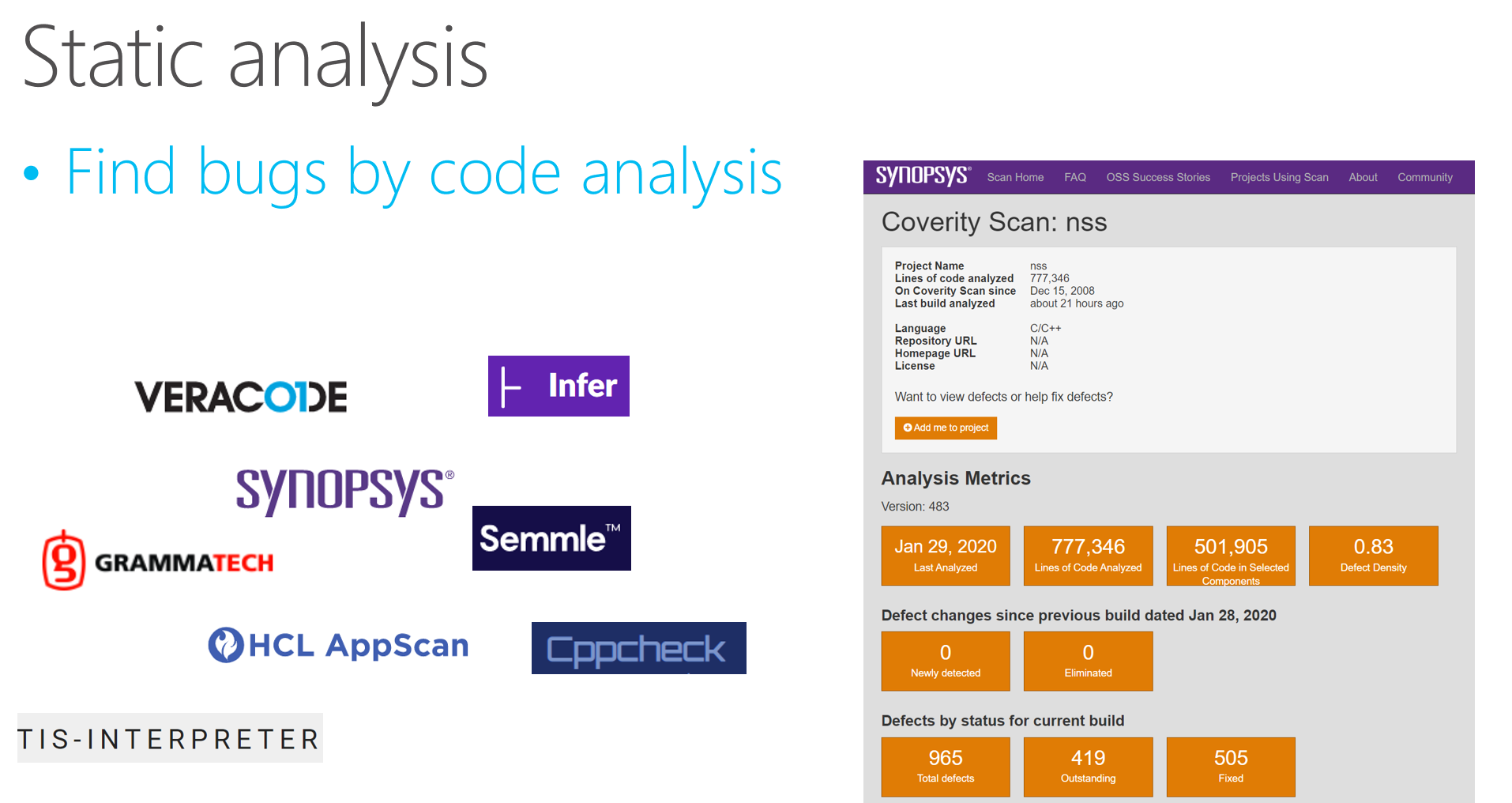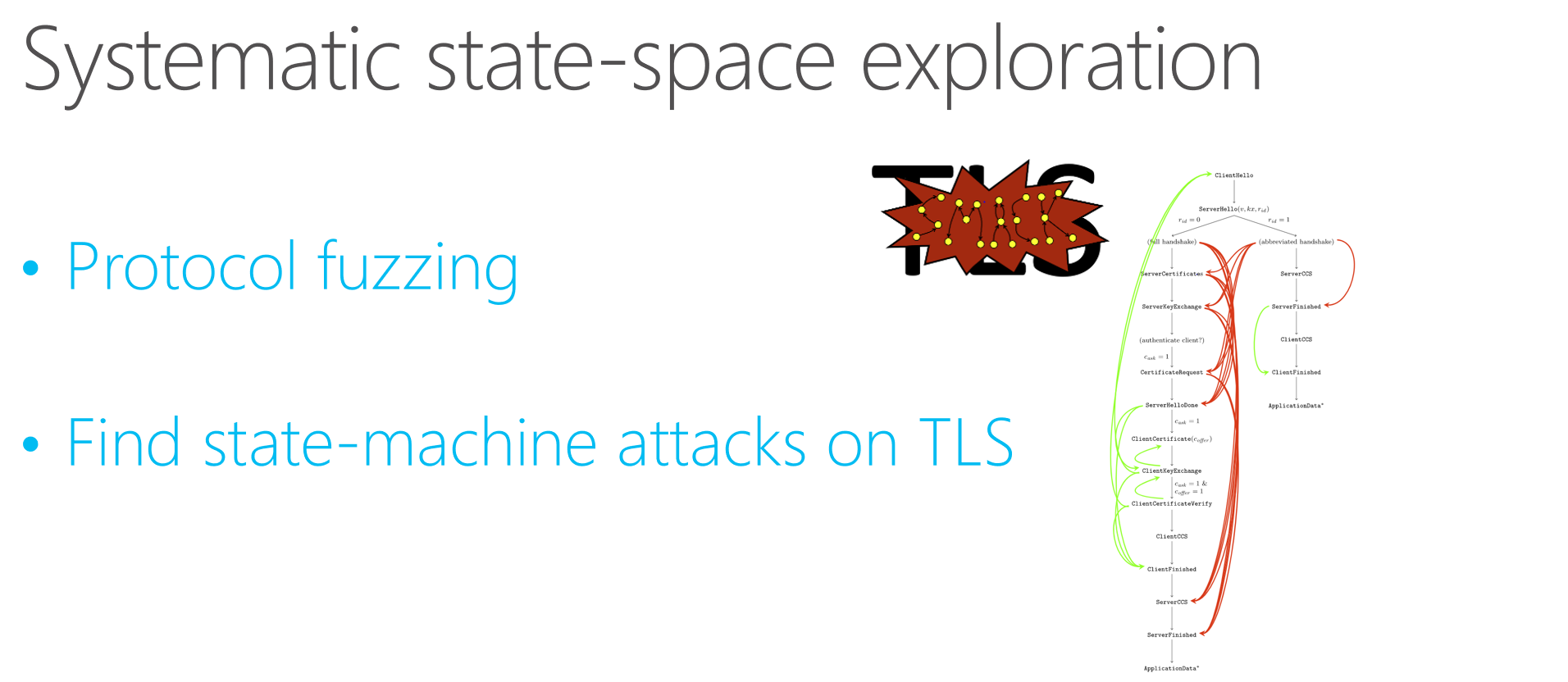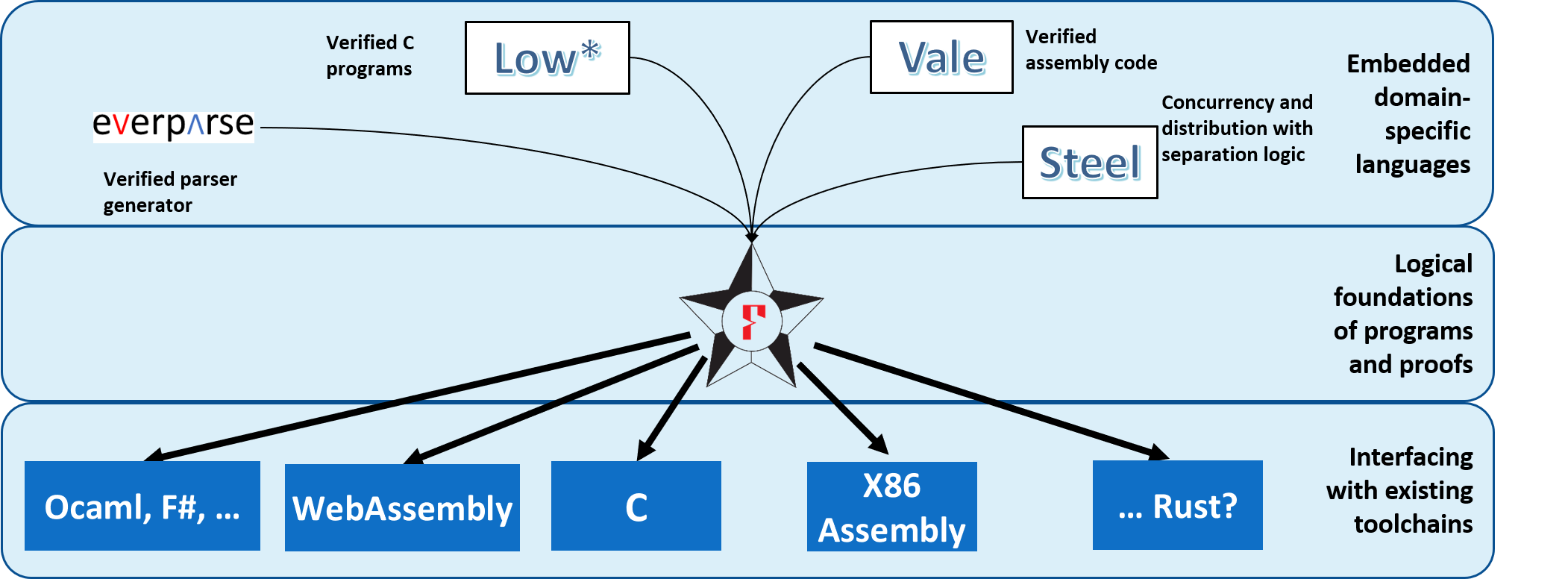Proof-oriented Programming in F*
Towards High-assurance Software
Through Code Analysis (1)

Through Code Analysis (2)

Through Code Analysis (3)

Full-scale Program Proofs
- Mathematical specifications of correctness and security
- Machine-checked proof that the code does not deviate from the spec
- Foundational: Against a formal machine model
- Integrated: Single theorem covering all the code

What is F*?
-
Functional programming language with effects
- like OCaml, F#, Haskell, …
- F* extracted to OCaml or F# by default
- Subset of F* compiled to efficient C code and to Wasm
-
Semi-automated program verifier using automated theorem proving
- like Dafny, FramaC, Why3, …
-
With an expressive core language based on dependent type theory
- like Coq, Lean, Agda, Idris, …
-
A metaprogramming and tactic framework for interactive proof and user-defined automation
- like Coq, Isabelle, Lean, PVS, etc.
-
And many foundational program logics for embedded DSLs
- Many variants of Hoare logic for sequential programs
- Concurrent separation logic, for concurrent and distributed programs
- Relational Hoare logic, for program equivalence and security proofs
A first taste
-
Write code in a syntax similar to OCaml, F#, Standard ML:
let rec factorial n = if n = 0 then 1 else n * factorial (n - 1) -
Give it a specification, claiming that
factorialis a total function from non-negative to positive integers.val factorial: n:int{n >= 0} -> Tot (i:int{i >= 1}) -
Ask F* to check it
fstar factorial.fst Verified module: Factorial All verification conditions discharged successfully
The F* Landscape

Program Proofs in F* for Billions of Unsuspecting Users

Contributors

Contributors
Microsoft Research, Inria Paris, CMU, MIT, Rosario, …
- many former members, interns, external contributors, … you?
The rest of this lecture
Today
-
The functional core of F*
-
Several style of proof illustrated on simple functional programs
-
Encoding effects: Simple verified stateful programming
-
Advanced stuff: A taste of what is possible
Basic types
-
Informal mental model: Types as sets of values
-
The empty type: It has no values
type empty = -
The singleton: It has exactly 1 value
type unit = () -
Boolean: It has exactly 2 values
type bool = true | false -
…
The functional core of F*
-
Recursive functions
let rec factorial (n:int) : int = if n = 0 then 1 else n * (factorial (n - 1)) -
Inductive datatypes (immutable) and pattern matching
type list (a:Type) = | [] (* Nil *) : list a | _ :: _ (* Cons *) : hd:a -> tl:list a -> list a let rec map (f: a -> b) (x:list a) : list b = match x with | [] -> [] | hd :: tl -> f hd :: map f tl -
Lambdas (unnamed, first-class functions)
map (fun x -> x + 42) [1;2;3] ~> [43;44;45]
Refinement types
type nat = x:int{x>=0}-
Informal mental model: A type describes a set of values
let empty = x:int { false } //one type for the empty set let zero = x:int{ x = 0 } //the type containing one element `0` let pos = x:int { x > 0 } //the positive numbers let neg = x:int { x < 0 } //the negative numbers let even = x:int { x % 2 = 0 } //the even numbers let odd = x:int { x % 2 = 1 } //the odd numbers let prime = x:nat { forall n. x % n = 0 ==> n = 1 || n = x } //prime numbers -
Refinements introduced by type annotations (code unchanged)
let rec factorial (n:nat) : nat = if n = 0 then 1 else n * (factorial (n - 1)) -
Logical obligations discharged by SMT (simplified)
n >= 0, n <> 0 |= n - 1 >= 0 n >= 0, n <> 0, factorial (n - 1) >= 0 |= n * (factorial (n - 1)) >= 0 -
Refinements eliminated by subtyping:
nat<:intlet i : int = factorial 42 let f : x:nat{x>0} -> int = factorial
Dependent types
-
Dependent function types (), here together with refinements:
val incr : x:int -> y:int{x < y} let incr x = x + 1 -
Can express pre- and post- conditions of pure functions
val incr : x:int -> y:int{y = x + 1} -
Exercise: Can you find other types for
incr?
Total functions in F*
-
The F* functions we saw so far were all total
-
Toteffect (default) = no side-effects, terminates on all inputsval factorial : nat -> Tot nat let rec factorial n = (if n = 0 then 1 else n * (factorial (n - 1))) -
Quiz: How about giving this weak type to factorial?
val factorial : int -> Tot int
let rec factorial n = (if n = 0 then 1 else n * (factorial (n - 1)))
^^^^^
Subtyping check failed; expected type (x:int{x << n}); got type int factorial (-1) loops! (int type in F* is unbounded)
Semantic termination checking
- based on well-founded ordering on expressions (
<<)- naturals related by
<(negative integers unrelated) - inductives related by subterm ordering
- lex tuples
%[a;b;c]with lexicographic ordering
- naturals related by
- order constraints discharged by the SMT solver
- arbitrary total expression as decreases metric
val ackermann: m:nat -> n:nat -> Tot nat (decreases %[m;n]) let rec ackermann m n = if m=0 then n + 1 else if n = 0 then ackermann (m - 1) 1 else ackermann (m - 1) (ackermann m (n - 1)) - default metric is lex ordering of all (non-function) args
val ackermann: m:nat -> n:nat -> Tot nat
Types are specifications; Total functions are proofs; Recursion is induction
let rec length (xs:list a) : nat =
match xs with
| [] -> 0
| _::tl -> 1 + length tl
let rec append (xs ys : list a) : list a =
match xs with
| [] -> ys
| x :: xs' -> x :: append xs' ys- Prove that the length of append is the sum of the lengths of its arguments
let rec append_length (xs ys : list a) : Lemma (length (append xs ys) = length xs + length ys) = match xs with | [] -> () | x :: xs' -> append_length xs' ys- Proof by induction on xs
- Base case,
xs=[]is easy:append [] ys = ys /\ length [] = 0 - Step: Use IH by calling function recursively on smaller arguments
- Sugar:
Lemma p = u:unit { p }`
- Base case,
- Proof by induction on xs
More Lemmas
let snoc l h = l @ [h]
let rec reverse (l:list a) : list a =
match l with
| [] -> []
| hd::tl -> snoc (reverse tl) hdlet rec rev_snoc (l:list a) (h:a)
: Lemma (reverse (snoc l h) == h::reverse l)
= match l with
| [] -> ()
| hd::tl -> rev_snoc tl hlet rec rev_involutive (l:list a)
: Lemma (reverse (reverse l) == l)
= match l with
| [] -> ()
| hd::tl -> rev_involutive tl; rev_snoc (reverse tl) hdProof of a program: QUICKSORT
let rec quicksort (f:total_order a) (l:list a)
: Tot (m:list a{sorted f m /\ is_permutation l m})
(decreases (length l))
= match l with
| [] -> []
| pivot::tl ->
let hi, lo = partition (f pivot) tl in
let m = quicksort f lo @ pivot :: quicksort f hi in
permutation_app_lemma pivot tl (quicksort f lo) (quicksort f hi);
mlet permutation_app_lemma (hd:a) (tl:list a)
(l1:list a) (l2:list a)
: Lemma (requires (is_permutation tl (l1 @ l2)))
(ensures (is_permutation (hd::tl) (l1 @ (hd::l2))))Beyond refinements: Indexed types
-
Length-indexed vectors
type vec a : nat -> Type = | Nil : vec a 0 | Cons : hd:a -> tl:vec a n -> vec a (n + 1) let rec append (v1:vec a n) (v2:vec a m) : vec a (n + m) = match v1 with | Nil -> v2 | Cons hd tl -> Cons hd (append tl v2) -
Red-Black Trees
type rbtree a : nat -> color -> Type = | Leaf : rbnode a 1 Black | R : left:rbnode a h Black -> value:a -> right:rbnode a h Black -> rbnode a h Red | B : left:rbnode a h cl -> value:a -> right:rbnode a h cr -> rbnode a (h+1) Black -
Concurrent computations indexed by separation logic specs
type m : a:Type -> p:slprop -> q:(a -> slprop) -> Type = | Ret: post:post_t st a -> x:a -> m st a (post x) post | Bind: ... | Act: ... | Frame: ... | Par: ...
Values and Computations
-
“Values” aka unconditionally total terms
-
Two classes of types
- Value types (
t):int,list int, … - Computation types (
C): conditionally pure, divergent, stateful, …
- Value types (
-
Dependent function types of the form:
x:t -> C- F* is call-by-value
- argument can't have side-effects, so value type
-
Two forms of refinement types
- Refined value types:
x:t{p} - Refined computation types:
- Stateful computations that can read and write the heap:
ST t pre post - …
- Stateful computations that can read and write the heap:
- Refined value types:
The divergence effect (Dv)
-
Some useful code really is not always terminating, e.g., an interpreter for a Turing complete language
let rec eval (e:exp) : Dv exp = match e with | App (Lam x e1) e2 -> eval (subst x e2 e1) | App e1 e2 -> eval (App (eval e1) e2) | Lam x e1 -> Lam x (eval e1) | _ -> e (* (\x. x x) (\x. x x) *) let main = eval (App (Lam 0 (App (Var 0) (Var 0))) (Lam 0 (App (Var 0) (Var 0))))
let rec server () =
let x = get_request () in
fork (handle x);
server()F* effect system encapsulates effectful code
-
Pure code cannot call potentially divergent code
-
Only pure code can appear in specifications
val eval : expr -> Dv exprtype tau = e:expr{e = eval e'} ^^^^^^ Expected a pure expression; got an expression ... with effect "DIV" -
Sub-effecting:
Tot t <: Dv t
(e.g. divergent code can include pure code)val subst : list (var * expr) -> expr -> Tot expr eval (subst [x, Num 0] e) : Dv expr
Verifying potentially divergent programs
(partial correctness)
- Using refinement types
val factorial : nat -> Dv nat - Or the
Divcomputation type (pre- and post- conditions)let rec eval_closed (e:exp) : Div exp (requires closed e) (ensures fun e' -> Lam? e' /\ closed e') = match e with | App e1 e2 -> let Lam e1' = eval_closed e1 in below_subst_beta 0 e1' e2; eval_closed (subst (sub_beta e2) e1') | Lam e1 -> Lam e1 Dvjust an abbreviationDv t = Div t (requires True) (ensures (fun _ -> True))
Monadic effects in F*
type st (a:Type) = heap -> Tot (a * heap)new_effect {
STATE : a:Type -> Effect
with repr = st;
return = fun (a:Type) (x:a) (h:heap) -> x, h;
bind = fun (a b:Type) (f:st a) (g:a -> st b) (h:heap) ->
let z, h' = f h in g z h';
get = fun () (h:heap) -> h,h;
put = fun (h:heap) _ -> (),h
}- this monadic definition is the model F* uses to verify stateful code
- It is an executable model, and you can choose to run your programs in the model
- But, state can be primitively implemented under the hood if you like
- for instance by C stack+heap
General approach to effectful programming
-
Program libraries to model effects
-
Derive effectful actions for primitive operations
read,write,alloc,throw,catch,fork,join, etc.
-
Write programs against these models and verify them with refined computation types
-
Extract them to OCaml, F#, C, Wasm, … Java? with primitive effects
-
F*:
let incr (r:ref int) : ST unit (ensures fun h0 _ h1 -> modifies {r} h0 h1 /\ h1.[r] = h0.[r] + 1) = r := !r + 1ML:
let incr (r:ref int) : unit = r := !r + 1C:
void incr (int *r) { *r = *r + 1; }
Demo
Reusable Verified Artifacts
F* as a Verification Backend
-
Vale: A Verified Embedding of a Verifiable Assembly Language
-
Session*: Multi-party Session Types, verifier by translation to F*
-
But, you need to work quite hard to tune the verifier to
- Get predictable and fast proofs
- Translate failed verifications back to the user
-
Encoding Java in F*, not likely to be easy
- Identify a small fragment of Java
- Or consider going the other direction: generate Java from verified F*, e.g., via Scala?
Resources to learn more about F*
-
Online tutorial in your browser
-
Many summer/winter schools, linked online
-
Many research papers
- Start with this one https://fstar-lang.org/papers/mumon/
-
An F* book, but still very incomplete and drafty

